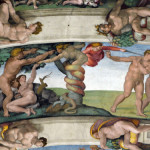We run our website the way we wished the whole internet worked: we provide high quality original content with no ads. We are funded solely by your direct support. Please consider supporting this project.
Imaging God Wrongly: God’s Self-Portrait, Part 2
Our relationship with God depends on the way we imagine God. When we get the image of God right, the doors open for us to trust and relate to God in the ways we were created to do. But there are so many images of God that are entirely messed up. Just think about the last movie you saw where God had some kind of role. How was he depicted? Whether it is the distant all-powerful figure in the clouds from Monty Python, Morgan Freeman’s character in Bruce Almighty, or the wrathful Yahweh in the recent televised series on The Story of the Bible, God is never depicted as he is revealed in Jesus.
So, how did we get to this place? How did we come to the place where it is so hard for us to actually see God for who he really is? Well, this question takes us back to the beginning.
Out of love, God placed the “tree of the knowledge of good and evil” in the Garden. It was God’s “No Trespassing” sign reminding Adam and Eve – and all of us – that we should never imagine we have the right or the capacity to judge God, others, or even ourselves by our standards of “good” and “evil.” If we’re going to love like God loves, we must always remember that God alone is the judge of the world. We can’t love and judge at the same time. (1)
As he always does, Satan took God’s loving act and gave it his own diabolic spin. He told Eve that the reason God forbid her from eating from the tree was because, “God knows that when you eat of it your eyes will be opened, and you will be like God, knowing good and evil” (Gen. 3:5). Satan painted a petty and untrustworthy picture of God. He made it seem like God was threatened by the potential the forbidden tree offered Eve.
Tragically, Eve believed the lie. Since her picture of God was no longer trustworthy, she stopped trusting God. Consequently, she felt she was on her own to become all she could be. So she violated God’s “No Trespassing” sign and ate from the tree. And, as the proverbial saying goes, “the rest is history.”
Behind all human rebellion and sin is a faulty picture of God. At the core of our being we crave a fullness of love, worth, significance and security that only our Creator can give. We have a hunger for an ongoing experience of fullness of LIFE – what Jesus called “life to the full” (Jn 10:10, NIV), and it never goes away as long as we have a surrendered relationship to the one who is himself “the fountain of life” (Ps 36:9). (To distinguish this kind of life from mere “biological life,” I’ll capitalize LIFE when referring to the “life to the full” that only God can give). All the beautiful plans God has for humans depend on our getting LIFE (that is, our core sense of worth, significance, lovability and security) from God and God alone. Everything we are created to do is meant to be an expression of the LIFE we freely receive from God.
Our souls are wired to crave this “life to the full.” But if we embrace an untrustworthy mental picture of God, we simply cannot enter into a LIFE-giving relationship with God, and this, in turn, means we will invariably try to acquire LIFE from what we accomplish, possess, achieve, from who we think we impress (including God, which is to say, from religion), or from the pleasures we experience. The Bible calls all such attempts to acquire LIFE for ourselves “idolatry,” and it lies at the root of all sin.
You can hear all the sermons in the world about how you shouldn’t try to get LIFE from idolatrous sources, and they will do you absolutely no good unless the hunger that drives you to idolatry goes away. Which means, the only way to get free of idolatry is to get all our LIFE from God. And the only way we can do this is to embrace an accurate, trustworthy and beautiful mental picture of the God who fills us with LIFE by passionately loving us.
Everything God created us to be depends on our entertaining a mental picture of the true, trustworthy, loving God. And everything Satan wants us to be depends on his deceiving us to entertain a picture of an untrustworthy, unloving, false God. Make it your life mission to cultivate the first and root out of your mind all vestiges of the second.
Greg
(1). For more on this, see G. Boyd, Repenting of Religion (Baker, 2005).
For a sermon on this topic, this one will prove helpful.
Category: Essays
Tags: Adam and Eve, Character of God, Essay, Idolatry, Imaginative Prayer, Picture of God, Religious Idolatry, Repenting of Religion, Tree of the Knowledge of Good and Evil
Topics: Christology
Related Reading

Sinful Nature and Free Will
Q: If our sinful nature is what causes us to sin/reject God, can we be held responsible for our sins, when this nature resulted from Adam and Eve’s sin? Do we really have the freedom to either choose/reject God if our sinful nature compels us to reject God? On the other hand, if our sinful…

Is there Archeological Support for the Reliability of the Gospels?
One of the many tests historians typically submit documents to in accessing their historical reliability concerns the extent to which archeology supports or undermines the historic claims the document makes. So we need to investigate the extent to which archeology confirms, or refutes, aspects of the Gospels. Before we address this question, however, a preliminary…

Knowing and Experiencing God
The way we view God is in part conditioned by the state of our minds and hearts. Origen put it this way: “[T]he Holy Spirit addresses our nature in a manner appropriate to its imperfection, only as far as it is capable of listening.”[1] In fact, Origen went so far as to argue that the…

False Gods in the Church
We often think of an idol as a statue, but an idol can be anything we use to meet the needs that only God can meet. In other words, a false god. There is no end to the false gods we create. In Western cultures we often strive to feel worth and significance by acquiring…

Podcast: Does God Hate People?
Greg talks about all those verses where God says he hates people. Be afraid. Be very afraid. http://traffic.libsyn.com/askgregboyd/Episode_0099.mp3

Repent! … From the Sin of Religion
People often think that being Christian is about “being religious,” but loving others in the way that Christ instructs us is about as far removed from religion as anything could be. Religion, as I use the term, is a system of beliefs and behaviors one embraces as a means of getting life—whether this be feeling…

